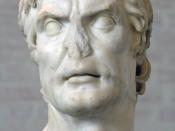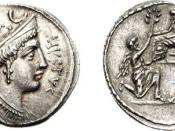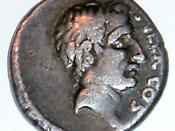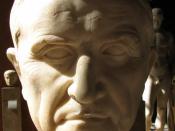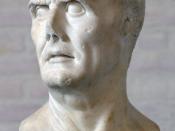The Aftermath of Carthage
The defeat of Carthage gave way to a new era in the Roman republic, characterised by numerous consequences. A great and worthy foe had been removed, however, to paraphrase Sallust, Rome was now entering a period of numerous disturbances, riots and civil war, namely because of the influence of a few powerful men who were able to gain personal power and prosecute all who stood in their way, all under the honourable precept of standing for the senate or the common people.
To begin, we must first understand the situation of the Roman Empire after the last Punic war. With Carthage defeated, there is no one left to fight, therefore conquest inevitably cesses. This gives way to a lack of economic benefits such as plunder, meaning the roman people are facing a limitation of profit. Also, this lack of benefit as well as the fact that Hannibal has completely ravaged most of the southern Italian plains means that there is a manpower shortage.
Less people want to join the army for there is no profit to be made and less people own land because of Hannibal, thus they cannot join. Therefore, the only way left to make money is through politics, which becomes increasingly more competitive and aggressive. Eventually, this will lead to the Republic witnessing men of power who will take things in to their own hands, beginning with Marius and Sulla.
Having both held consulship, Marius and Sulla will be the first to bypass the senate and use the army in order to attain supreme power. In 89 B.C., Marius, wishing to regain consulship from Sulla, will go against the senate and take control of the army to chase Sulla out of Rome. However, Sulla will rejoin his army who have been fighting the Italian rebels, the later having been previously refused citizenship by Marius in 90 B.C., the cause of his loss of consulship to his rival. Choosing to stand by their leader instead of remaining loyal to the empire, Sulla's troops will march on Rome and force Marius out. Acquiring full control in 82 B.C. after the battle of Colline Gate, Sulla will ensure that he remains unchallenged by issuing the proscriptions, a collection of death lists on display in the forum. Anyone on the lists could be put to death at any time, which inevitably led them to be modified so Sulla's loyal followers could claim their belongings for a low price and sell them for profit. However, these lists were mainly created so that people presenting a nuisance to Sulla could be dealt with.
After Sulla's death in 78 B.C., chaos and revolt will emerge, with many people taking after his example. After failing to gain consulship, Lepidus will gather an army of poor citizens and attempt to march on Rome in 78, however his attempt will fail and he will be slain in battle. In the spring of 73 B.C., Sparticus, a gladiator, will lead a massive slave rebellion. Unfortunately for him, it will be put to an end by Crassus and Pompey. Ten years later, in 63 B.C., Catiline will form an army after losing the election for consulship, but will also be defeated. Sulla therefore influenced many people in gathering his own army to gain power, however his actions will be the source of serious consequences, beginning with the first triumvirate.
Born in 61 B.C., the first triumvirate is comprised of Crassus, Pompey and Caesar. A behind the scenes alliance that's goal is to illegally run Rome, the triumvirate uses the wealth of Crassus, the oral skills of Caesar as well as the military power of Pompey to take over the state. Because of this secret alliance, the ideal of the Roman Republic dies out. Rome is now controlled by a select group of power-hungry men and no one can stand in their way. With time, the empire will bear witness to Caesar appointing himself as dictator for life, a second triumvirate and finally the imperial period, beginning with the triumph of Augustus in 30 B.C. at the end of the civil war. All of this will be characterised by aggressive behaviour and the utilization of private armies in order to obtain complete dominance. It should also be noted that the proscriptions were reissued during the second triumvirate as well as during the rule of Augustus. All of these events stem from Sulla, and because of his ruthless actions Rome began to fall under the rule of the few who imitated his quest for power.
To recapitulate, the removal of the Carthaginian threat made for less conquest for the Roman Empire, leading to less loot to acquire. With no profit in joining the army, the only way to gain economical benefits was in the domain of politics. As a result, political competition sky-rocketed, with private armies emerging to serve men who strived for power. Starting with Sulla's march on Rome, the Roman Republic slowly decayed in to a state characterised by the rule of the few and massive revolts. Sallust is therefore far from demonstrating ignorance in the twelfth passage of Historiae 1.
